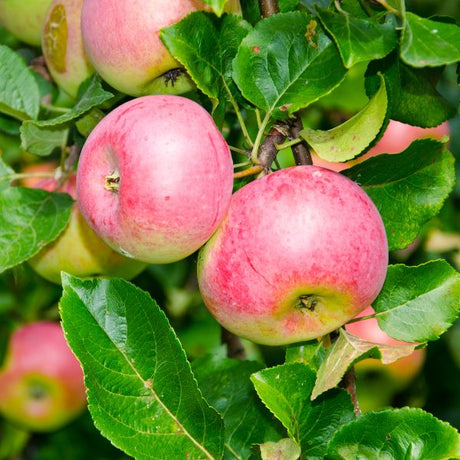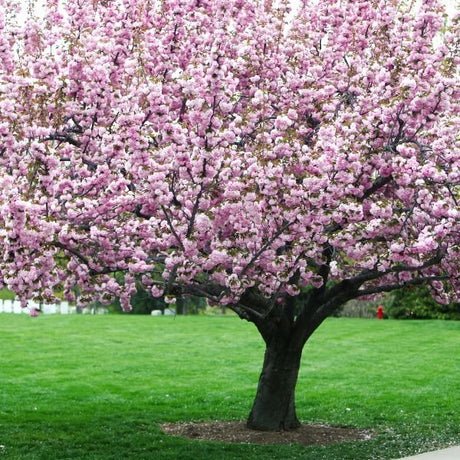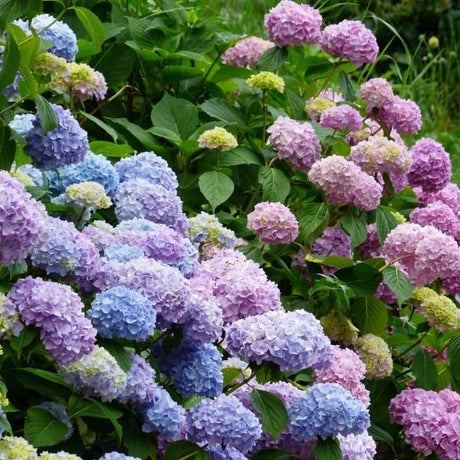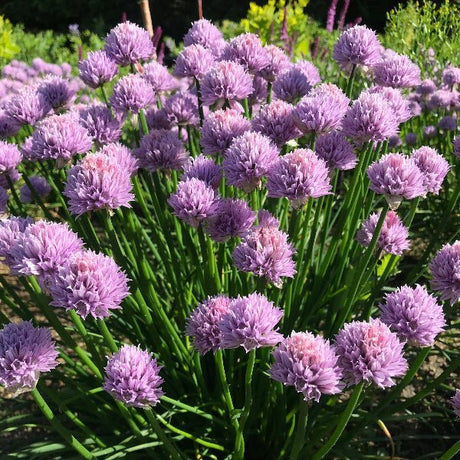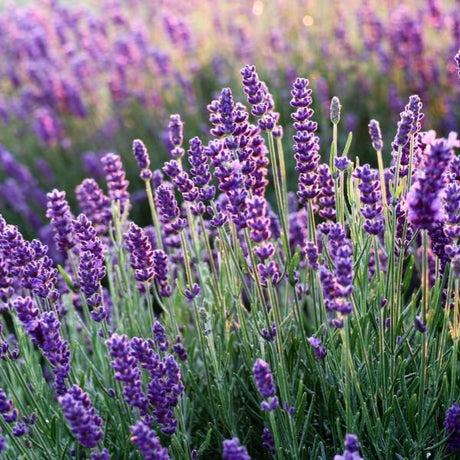Improved Semi - Dwarf Meyer Lemon Tree
Citrus limon 'Meyer Improved'
- Stay Protected with Plant Sentry ™
Improved Semi - Dwarf Meyer Lemon Tree - #5 Container is backordered and will ship as soon as it is back in stock.
Plant Sentry™
Plant Sentry™

Plant Sentry™ Protected
Your order is protected by our compliance system that:
- Prevents restricted plants from shipping to your state
- Ensures plants meet your state's agricultural requirements
- Protects gardens from invasive pests and diseases
Delivery and Shipping
Delivery and Shipping
Delivery and Shipping
Fast, Safe Plant Delivery
Ships in 3-4 business days • Tracking provided • Weather protected
| Under $50 | $9.99 |
| $50 - $99.99 | $14.99 |
| $100 - $149.99 | $16.99 |
| $150+ | $24.99 |
✓ Zone-specific timing • ✓ Professional packaging • ✓ Health guarantee
Understanding Plant Options
Nature Hills offers plants in two main formats:
- Container Plants: Grown in pots with soil, sized by container volume and plant age
- Bare Root Plants: Dormant plants without soil, sized by height measurements
Container Plant Sizes
Container sizes indicate plant age and growing capacity rather than liquid volume equivalents. Our containers follow industry-standard nursery "trade gallon" specifications, which differ from standard liquid gallon measurements.
Young Plants (6 months to 18 months old)
| Container Size | Actual Volume | Metric Equivalent |
|---|---|---|
| 2" x 2" x 3" | 0.18 - 0.21 dry quarts | 0.20 - 0.23 dry liters |
| 4" Container | 0.31 - 0.87 dry quarts | 0.35 - 0.96 dry liters |
| 4.5" Container | 0.65 dry quarts | 0.72 dry liters |
| 6" Container | 1.4 dry quarts | 1.59 dry liters |
| 1 Quart | 1 dry quart | 1.1 dry liters |
| 5.5" Container | 1.89 dry quarts | 2.08 dry liters |
Established Plants (18 months to 2.5 years old)
| Container Size | Actual Volume | Metric Equivalent |
|---|---|---|
| 2 Quart | 2 dry quarts | 2.2 dry liters |
| #1 Container | 2.26 - 3.73 dry quarts | 2.49 - 4.11 dry liters |
| 5" x 5" x 12" | 3.5 - 4.3 dry quarts | 3.85 - 4.74 dry liters |
Mature Plants (2-4 years old)
| Container Size | Actual Volume | Metric Equivalent |
|---|---|---|
| #2 Container | 1.19 - 1.76 dry gallons | 5.24 - 7.75 dry liters |
| #3 Container | 2.15 - 2.76 dry gallons | 8.14 - 12.16 dry liters |
Large Plants (3-5 years old)
| Container Size | Actual Volume | Metric Equivalent |
|---|---|---|
| #5 Container | 2.92 - 4.62 dry gallons | 12.86 - 20.35 dry liters |
| #6 Container | 5.25 - 6.01 dry gallons | 23.12 - 26.42 dry liters |
| #7 Container | 5.98 - 6.53 dry gallons | 26.34 - 28.76 dry liters |
Bare Root Plants
Bare root plants are sold by height from the root system to the top of the plant. Plants may exceed minimum height requirements.
Common Sizes:
- Trees: 1 foot, 2 feet, 3 feet, 4 feet, 5 feet, 6 feet
- Shrubs & Perennials: 1 foot, 18 inches, 2 feet
Important Notes
Container Volume Specifications
- Trade Gallon Standard: Our containers follow industry-standard "trade gallon" specifications established by the American National Standards Institute (ANSI Z60.1) for nursery stock
- Volume Variations: Actual soil volume may vary due to plant root systems and growing medium settlement
- Age Indicators: Container size primarily indicates plant age and maturity rather than liquid volume equivalents
Growing Conditions
- Plant size can vary based on variety and growing conditions
- Container size helps indicate plant maturity and establishment level
- Larger containers generally mean more established root systems and faster landscape establishment
Seasonal Availability
- Bare root plants are available seasonally when dormant
- Container plants are available throughout the growing season
- Specific varieties may have limited availability in certain sizes
Questions?
For questions about specific plant sizes or availability, please contact our plant experts who can help you choose the right size for your landscape needs.
Plant Highlights
Improved Semi - Dwarf Meyer Lemon Tree highlights at a glance!
-
Brand
-
Botanical Name
-
Mature Height
-
Mature Spread
-
Sun ExposureFull Sun
-
Moisture
-
Soil
-
Growth RateMedium
-
Flower Color
-
Fall Color
-
Pollinator Required
-
Pruning Time
-
Bloom PeriodLate Spring, Summer, Fall
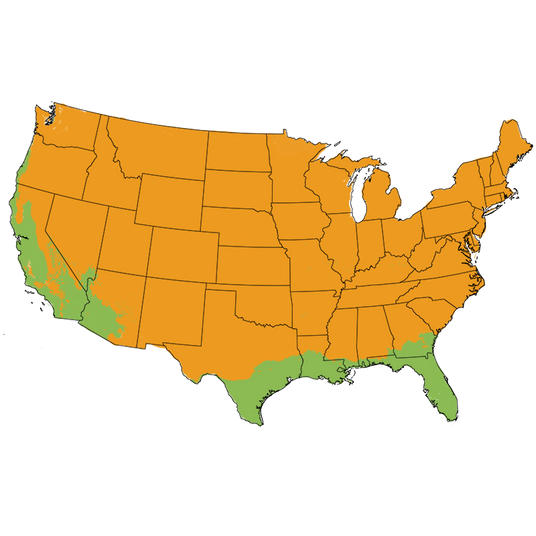
Growing Zones
The Improved Semi-Dwarf Meyer Lemon Tree (Citrus limon 'Meyer Improved') is a semi-dwarf variety that produces exceptional well-known fruit on a smaller plant. It is expertly grafted onto a semi-dwarfing rootstock that has displayed incredible resistance to the Tristeza virus! Improved Meyer Lemon Trees get their improvement by being derived from thoroughly tested, virus-free plant material, so you don't need to worry about any issues arriving with the tree! These are perfect Citrus trees - especially in terms of ease of care and large fruit set, Meyer Lemons are the number one Citrus grown worldwide!
Fortunately, it's easy to grow your own! If you live where winter temps dip below 40°F, simply plant it in a container and protect it from frost! You'll bring the trees indoors, and put them in front of your sunniest window during the winter months! Plus you'll enjoy a fantastic houseplant and summer patio accent! You'll love the compact, upright growth habit, and glossy, dark green evergreen leaves give a tropical flair to your landscape.
Meyer Lemon trees are said to have a Mandarin Orange parent That's why the fruit is yellow-orange in color, with a thinner, smooth rind - and the fruit is medium-sized short elliptical in shape. It's also why the ripe fruit is sweeter than a true Lemon and has a hint of orange flavor. The Meyer is a winner for fresh eating and lemonade.
Meyer Lemons are not reliably available in grocery stores. Even though they win taste tests, these Lemons just don't ship well with their thin rind. Meyer Lemons are rounder than traditional Lemons and are slightly less acidic, though they maintain their tart Lemon quality while the skin is yellow. Once the skin turns light orange, it'll get even sweeter. The flesh, juice, and rind are highly prized by chefs and foodies alike! The Meyer Lemon is included with most all recipes requiring Lemons. Good with fish, great in marinades, with tea and to make a fresh lemon meringue pie. Many prefer the Meyer over the traditional Lemon.
Planting and Application:
The trees are equally remarkable as houseplants, ornamental patio plants, or as a unique focal point with year-round glossy foliage. Plant by your patio for easy access to its wonderful fruit and that redolent Citrus fragrance that perfumes your home in late fall and early spring. It's hard to believe how well those tiny white, fragrant flowers can freshen your home with the clean, crisp scent of fresh Citrus!
Used as a shrubby plant or trained into a tree, you'll gain a wonderfully productive barrier! Growing slightly taller and wider than the Dwarf Meyer Lemon, semi-dwarfing rootstock enables these trees to attain a 10-15 foot mature height. Site these trees to block out the hot afternoon sun. This is a fabulous plant for an evergreen hedge and privacy screen! Grown in the ground with the lowest branches pruned up and back to a single trunk, the Semi-Dwarf Meyer Lemon makes a great evergreen accent tree in the landscape.
You can also plant your Semi-Dwarf Improved Meyer Lemon in a container and enjoy the fruit and the ornamental quality on the patio or as a container specimen in the landscape! The Meyer is one of the more dependably productive container fruit trees you can grow. For indoor/outdoor growers, the Meyer Lemon is an easy one to get started with!
- Fantastic Thin Rind Lemons
- Incredibly Fragrant White Blooms
- Self Fertile & Great Fruit-Set Indoors
- Virus-Free Cloned Plant
- Indoor/Outdoor, Evergreen Foliage, Hedge, Container Plant & Patios
#ProPlantTips for Care:
Lemon Trees are adapted to a wide range of growing conditions across the United States, and the Improved Meyer Lemon tree is one of the most versatile of all Citrus plants and fruits. These are among the easiest Citrus for novice gardeners to grow!
Pruning Tips
These trees can be easily pruned to accommodate different landscape settings, as well. These semi-dwarf trees can be kept to less than four feet tall, and still remain very productive.
For best fruiting, prune out any crossing branches, and non-fruiting branches that grow straight upwards. You can also prune off the lower side limbs to keep a single-trunked tree form. Remove branches that grow towards the center of the plant. You'll want to encourage enough air circulation in the middle of your tree.
Container Soil Mix
Indoor Citrus prefers a lower pH soil around 6.0 to 6.5, so plant using an acid planting mix. Add Pathway bark at the rate of 25% of the total volume of your container. Adding acidic bark will support soil structure for a long time your plant will be in the pot.
If you'll be growing it in a decorative container, please make sure the pot has plenty of drainage holes. You may want to drill additional holes in your pot, as Improved Semi-Dwarf Meyer Lemons will not tolerate sitting in standing water!
Care for Indoor Plants
Container Citrus should be fertilized quarterly using an acid-based fertilizer like Dr. Earth Acid Lovers Organic and Natural Premium Fertilizer.
For indoor winter care, be sure to transition your tree indoors and then back outside again. Watch our video on how to successfully bring tropical Citrus indoors for the winter.
For both indoor and outdoor growing, create the most favorable conditions indoors to assist in fruit ripening and flowering. A bright, sun-filled location is important, as is a location away from heat sources. Finally, be careful about overwatering when indoors. These conditions will help to ensure a healthy, fruitful plant.
Protecting Citrus From Chill
Although Citrus can grow year-round in warmer regions (zones 9 and 10), they can also thrive in colder areas (zones 4 to 7) as long as the tree is brought indoors before the first frost of winter.
In zone 8, you can cover your tree in the event of a cold snap or unexpected overnight freeze. Citrus should be planted in a sheltered spot to avoid the worst of the chill, and not planted in a low area that collects cold air. If a spot like that is unavailable, or you are in a chill-prone climate, then you are safer planting Citrus Trees in a large, deep container with wheels to easily move them to a protected location or indoors when needed.
In cold growing zones, begin slowly acclimating your tree indoors in the fall, or into a protected location, eventually moving your tree inside. Indoor plants need a bright indirect sun window, greenhouse, sunroom, or enclosed patio for the winter. In spring, reverse this process and begin acclimating your tree to again be back out in the full sun all summer. This reduces stress and leaf drop.
- Give your plant a sunny spot that receives at least 8 hours of direct sun a day.
- The right temperature is between 50 - 80°F and on the cooler side indoors.
- Need humidity - dislike dry winter air and drafts. Keep your plant away from heating vents.
- Citrus trees need good air circulation
- Don't overwater. Keep it on the dry side indoors, and allow the soil to dry slightly between waterings. Check every week and use the Finger Test to see if the soil is moist below the surface. Simply push your index finger into the soil. If it's moist, skip watering that week. If it's getting dry, give it a good watering.
- Mop up any water that remains in the saucer. Don't keep your Citrus Trees in standing water, the root systems will not tolerate that!
Tips for the Best Fruit Set
After the blooms pass, clusters of Lemons will appear and begin to ripen. Heavy, dependable fruit production year after year is one of the biggest reasons for this tree's popularity! Bright sunlight, moderate temperatures, humidity, and proper watering play a big role in a successful crop.
Pollination can occur indoors without your assistance because of these self-pollinating blooms! But, you might want to give your indoor trees a helping hand. When in bloom, lightly shake the blooming branches or dab at them with a paintbrush. This will replicate the movement of outdoor breezes, so use a very gentle touch.
The fruit set is very dependent even indoors! You'll want to find a good spot indoors, such as a sunny window, in greenhouses or sunrooms are all very good locations. However, during the first season, thin any excessive fruit that can interfere with the tree's vegetative growth. Just leave a few fruits to enjoy and look forward to the larger crops in the future!
You'll know when your Lemons are ripe when the rind is bright yellow, but you can enjoy them until they ripen to a light orange. When picked at this time, your Meyer lemonade will require no additional sugar.
You, your family, and your friends will love having access to these amazing, delicious Lemons with their tremendous depth of flavor. Order your Improved Semi-Dwarf Meyer Lemon Tree from NatureHills.com and enjoy a larger version of the great Citrus Tree standard that you know and love!

